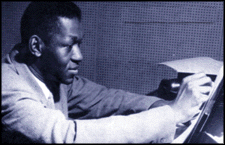 |
| HERBIE
NICHOLS |
| (1919-1963) |
| piano,
composer |
|
"...anyone who plays or even contemplates playing a song
of Herbie's is making this planet a better place. This music teaches many
things, but most importantly the sanctity of our minds and imaginations --
the Third World that lives in each of us." -- Roswell Rudd
In the list of 'obscure, criminally overlooked geniuses of jazz',
Nichols must rank near the top. While a prolific composer of well over a
hundred works (most of which have been lost), Nichols' recorded
interpretations of his own work consist only of a series of piano trio
recordings from the mid-50s. He spent most of his career as a sideman in a
number of revivalist Dixieland bands, his own music apparently considered
'unmarketable'...
Nichols' compositions displayed 'quirky' yet
completely logical melodic twists, the integration of drum parts into
melodic lines, and in particular demonstrated a variety of 'song forms'
quite different from the standard 32-bar and blues forms still prevalent in
the mid-50s. This 'intellectual difficulty' combined with his own unassuming
personality kept him from achieving much notoriety in his lifetime outside a
small circle of musicians and followers.
A good document of his
career can be found in A.B. Spellman's Black Music: Four Lives
(originally Four Lives in the Bebop Business). During his career
Nichols was largely considered to be a 'less eccentric Monk', although
similarities in their musics and playing styles are largely superficial:
"Herbie's style seems to fall, in a musicological sense,
between those of Teddy Wilson and Thelonious Monk. He has the keyboard
dexterity, the clarity, the sonorous tone, and the elegant, well-developed
melodies of Wilson. The resemblance to Monk, his contemporary, is more
apparent, though the equally apparent differences make it obvious that Monk
was not Herbie's influence. The dissonances and a kind of melodic structure
based on a preconceived rhythmic development which are common to both
pianists were potent in the early Fifties, and Monk and Herbie were two of
the very few to exploit that potency...if Herbie had been a more publicized
musician, he would have been an important influence on that generation of
pianists that came along in the Fifties, and possibly he would have provided
an alternative to the John Lewis and Bud Powell approaches which dominated
the period." (--Spellman)
Fortunately, the Nichols trio sides were reissued in the late 70s and
into the 80s, and through the years his music has been championed by others,
particularly Misha Mengelberg and Roswell Rudd (who wrote fine essays for
both the Blue Note and Mosaic packages), and in recent years his music has
been interpreted by an growing number of musicians (e.g. Geri Allen, Buell
Neidlinger, Dave Douglas...)
DISCOGRAPHY
(this includes only Nichols' recordings of his own works, and is
taken from the Mosaic
Complete Recordings of Herbie Nichols
box; a number of recordings as sideman,
with Danny Barker, Snub Mosely
and others, are omitted.)
Chocolate Williams/Herbie Nichols:
several tracks recorded for HiLo and Savoy, 3/6/52 (reissued on CD, Savoy
12100, under the title "I Just Love Jazz Piano", which
also includes tracks by Hampton Hawes, John Mehegan and Paul Smith.
Perhaps typically (even in the reissue), Nichols' two compositions are not
credited.
Herbie Nichols: The Third World
(Blue Note LP BN-LA-485-H2, reissued 1975; CD?) recorded 1955-56 with Al
McKibbon, Teddy Kotick, Art Blakey, Max Roach. Double-LP of 22 tracks,
reissued with alternate takes and unissued compositions on Mosaic's
Complete Blue Note Herbie Nichols (Mosaic
MR5-118, which may be out of print).
The Bethlehem
Years (Bethlehem BCP-6028, reissued 1976; Original title and
CD reissue, Love, Gloom, Cash, Love) --
recorded 1957, with Dannie Richmond and George Duvivier.
SOME RECORDINGS of NICHOLS' COMPOSITIONS BY OTHERS:
(note that there is no attempt here to keep an exhaustive,
all-inclusive list! Mainly these are recordings that I've heard
personally...)
Mary Lou Williams (1951) (title unknown) --
Atlantic LP 114, LP 1271
Archie Shepp (with Roswell Rudd):
Live in San Francisco (1966) - Impulse 9118 (one track)
Misha Mengelberg/Steve Lacy/Rudd: Regeneration
(1982) - Soul Note SN 1054 (one side)
Mengelberg/Lacy/George
Lewis: Change of Season (1984) - Soul Note SN 1104
Mengelberg (arr.) & ICP Orchestra:
Extension Red White & Blue (1984) -- ICP 025 (cassette only?)
Charlie Haden/Paul Motian/Geri Allen: Etudes
(1987) - Soul Note 121 161-1 (one track)
Steve Lacy/Mal
Waldron: Hot House - RCA Novus 3098-2-N (1990 - one
track)
Buell Neidlinger/Marty Krystall: Blue
Chopsticks (1995?) K2B2
Dave Douglas:
Constellation (1995) - Hat Art (one track)
Clusone
(Han Bennink, Ernst Reijseger, Michael Moore): I'm an
Indian Too (1994) -
Ramboy/Gramavision (one track)
Roswell Rudd: The Unheard Herbie Nichols, Vol. 1 & 2
(1997) - CIMP
Matt Wilson: Going Once,
Going Twice (1998) - Palmetto (one track)
Duck Baker:
Spinning Song (1998) - Avant 040 (an entire session of
Nichols compositions - solo acoustic guitar!)
Eric T. Johnson:
Herbie Nichols Volume One (2003) - Summit DC 351 (Boston guitarist; also
features George Garzone)
prepared by Damon Short -- corrections
and additions welcome
Damon Short homepage

